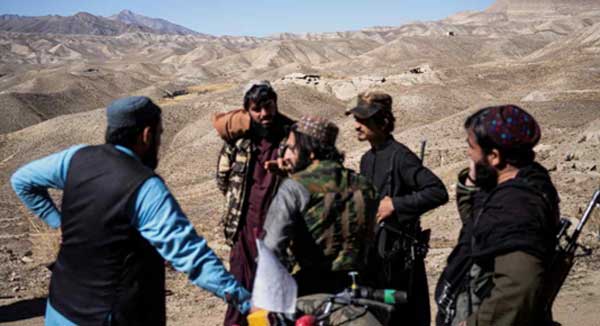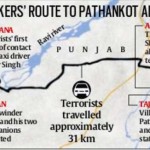IDR Blog
Pakistan-ISK reciprocity in countering Taliban
On January 20th,2024, a violent conflagration between the Afghan armed forces and Pakistani military broke out along the Durand line in Sirkanay district in Afghanistan. Heavy artillery exchange between the two groups occurred.
The border skirmishes between the two countries has been afrequent occurrence. Taliban claimed the current disruption was the consequence of Pakistan’s policy to settle and encroach along the Afghan border areas and hence the recent conflict in Sirkanay comes unprecedented in its efforts to counter Pakistan.
According to a former Tehreek-e-Taliban commander, Ehsanullah Ehsan, Pakistan in its ploy to encroach into Afghanistan, has carried a “Kashmir Style Infiltration”. Pakistan, as seen in Kashmir, has tried to create a diversion through an armed conflict along the Durand line by engaging the Afghan armed forces and latertaken the advantage to move the allied terror group or specific individuals within the designated targeted territory by giving them the cover through the military.
Ehsan, further stated that due to Pakistan’s actions, the Afghan soldiers had no choice but to pull a retaliatory fire on Pakistani post to counter the development.
Pakistan on the other hand blamed the conflict on Afghanistan,by stating that Taliban’s objection to therepairs along the border fencewas the primary cause for the violent engagement.
TTP believes that Pakistan has been utilizing the ISIS cadre in close coordination with its army to infiltrate Afghanistan.
The possible and what seemed like a highly unlikely symbiosis between Daesh and Pakistan could be owed to two factors.
The first, ISIS Khorasan (ISK) has viewed the Taliban as a rival in regards to Jihad. ISIS Khorasan has expressed its desire to use Afghanistan as a launching board for jihad in South Asia. It considers Taliban as a fake jihadist organisation who has not only softened in its jihadist approach, but has opened alliances with nations such as China and America whom the Isis deems as “kuffars” and enemies. China’s staunch stance on detention and ethnocide of the Uyghurs has been openly condemned by ISK, who like the Al Qaeda, declared Jihad on China. In past years, Isis has developed several safe havens in various pockets of Afghanistan. These serve as shelters for its core commanders and several Muslim fighters which may belong to various alliances. With the prevalent Isis network in Afghanistan and Taliban’s exit from the jihadist war theatre, it is evident that Isis planned to exploit the circumstances to gain monopoly on jihad in South Asia. Since Taliban’s takeover of Afghanistan, Taliban has executed several witch-hunts to detain and neutralize the threats it felt from the previous Afghan administration, which included individuals from military, intelligence and various resistance groups. At this point, many from the anti Taliban regime were known to have joined Taliban’s rival factions for survival.
Besides the anti Taliban groups, several Taliban cadres too, were left unemployed and it is believed many from the Taliban cadre to have sought employment with Isis to continue their personal Jihad.
It is also imperative for the Isis Khorasan to present it’s influence and terror grandeur in the South Asian region, to also seek the approval and donorship from its parent Isis Central and similar jihad empathizing sponsors.
In this fashion, Isis attains three important objectives. The first objective would be to increase its influence exponentially in the jihadist circles, second- to discredit Taliban as a failed jihadist organisation and lastly- to get the backing from Pakistan, who is miffed with Taliban.
The second factor for the Isis-Pakistani alliance comes from the Tehreek-e-Taliban Pakistan (TTP) and Pakistan’s talks going rancid in 2023. Since TTP called off cease fire on Pakistan, TTP has orchestrated several attacks on Pakistani government and military establishments and even aligned with various insurgent groups in Pakistan. Pakistan has consistently accused Taliban of harbouring the TTP core commanders on the Afghan soil and for carrying activities against Pakistan. Taliban has consistently denied all accusations. With the looming TTP threat in Pakistan, it can be expected that Pakistan would exploit the Daesh connection to meet a collaborated and similar goal to deter Taliban.
Pakistan’s aim to gain a strategic depth in South Asia through Taliban’s rise in Afghanistan has dissipated as a pipe dream, so it is expected for a disgruntled Pakistan to utilize necessary resources to infiltrate the geopolitical arena in Afghanistan using the arch-rival Isis.
In an article written by a former TTP commander for Sunday Guardian, the former also confirms the existence of anagreement called the “Dabori Agreement” which was made between Daesh and Pakistani ISI and GHQ Rawalpindi. The agreement is named after the Daborivillage in Orakzai district of the Khyber Pakhtunkhwa (KP) province of Pakistan, which is a home ofseveral senior ISIS leaders.
Daesh is believed to have honoured the agreement, owing to the fact that the outfit wants legitimacy for its branch in Pakistan despite their announcements of Wilayat Pakistan. According to the TTP commander, Ehsanullah, there have been few reported attacks carried by ISK on Pakistan, but they have been orchestrated on behest of Pakistani military on civilian and non- military targets.
The ISK leaders have been reported to be utilizing ISI provided guesthouses as well. Majority of the Daesh leaders are said to be from the Orakzai Agency of Pakistan. Orakzai Agency is considered as one of the importanthives of the ISK. The first chief of ISK was also from the same region.
Several ISK members from Orakzai Agency belonging to various tribes such as Ali Khel tribe, Mamuzaitribe,Akhil’s tribe, Mushti Khel tribe, Mullakhiltribe and Ferozakhil tribe are under the protection of the ISI and enjoying the benefits of Pakistani assets.
Conclusion
Since Pakistan’s failed aspirations to build close alliance with Taliban to secure a strategic depth in Afghanistan, it is apparent that Pakistan would be expected to reassess its Taliban policy.
Pakistan’s extolling of the Taliban has clearly failed in garnering any good will or favours from the Taliban as Afghan Taliban continues to support the TTP and even tried to mediate a talk between the two.
Presently, Pakistan faces attacks internally and externally from the TTP and the Afghan Taliban.
While the TTP core commanders have been chiming in about ISI involvement with ISIS against Afghanistan, ISI has remained silent on the matter. However, the possible connection may be revealed through the ISK modules being caught in India, which have also proved to have the support of the Pakistani ISI.
In a recent National Investigation Agency (NIA) report, it was mentionedthat two ISIS terror operatives Shahnawaz Alam and Mohammad Rizwan Ashraf following the instructions of an ISIS handler, conspired with ISI and Farahtullah Ghori to carry out terrorist activities in the Delhi/NCR.
Like the Afghan claim, the intelligence and investigation agencies in India believe that ISI, along with its associated terror organisations such as ISK, is carrying terror activities in India.
Pakistan has interchangeably been hand in gloves with several terror outfits which it nurtured and tried to use against another Pakistan deemed terror outfit as its duplicitous counter terrorism strategy.
As a result of its suicidal duplicity, there is an increment in terrorist attacks inside the country while it also struggles to maintain itself due to its dysfunctional polity.
Post your Comment
One thought on “Pakistan-ISK reciprocity in countering Taliban”
 Loading Comments
Loading Comments





Very well written